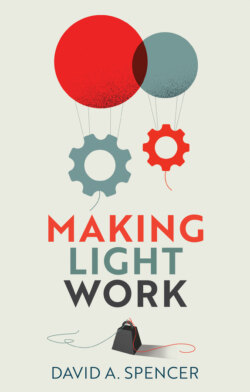Making Light Work

Реклама. ООО «ЛитРес», ИНН: 7719571260.
Оглавление
David A. Spencer. Making Light Work
CONTENTS
Table
Guide
Pages
Making Light Work. An End to Toil in the Twenty‑First Century
Dedication
Acknowledgements
1 Introduction
Work, work, work
Notes
2 Meanings of Work
The curse of work
The virtue of work
Work and alienation
Work as art
Work beyond work
Notes
3 The (Lost) Dream of Working Less
In the long run, we will all work shorter hours
The never-ending story of work
Power matters
Demanding work
The benefits of working less
Notes
4 Realities of Work: From Bullshit Jobs to Good Work
Bullshit jobs
The ills of work
The costs of unemployment
The quality of work
Notes
5 Demanding Better Work for All
Choosing the work we want
The illusion of free choice
Adapting to adversity
Power trumps efficiency
The human costs of low-quality work
Equalizing the distribution of high-quality work
Justice in work
Notes
6 Automation and a World without Work
Machine dreams
Technology, automation and the quality of work
A lament for work
Automating drudgery
Ownership matters
Notes
7 Working for Change
The limits to growth
Crisis capitalism
Beyond full employment
Income support
Working less is more
Reimagining work
Notes
8 Conclusion
Making light work
Notes
References
Index. A
B
C
D
E
F
G
H
I
J
K
L
M
N
O
P
Q
R
S
T
U
V
W
POLITY END USER LICENSE AGREEMENT
Отрывок из книги
David A. Spencer
I have gained from working with Matt Cole, Chris Forde, Simon Joyce, Chris McLachlan, Mark Stuart and Xanthe Whittaker on different research projects and from participating in the ESRC Digital Futures at Work Research Centre.
.....
In writing this book, I am conscious of a number of recent books on the subject of work. These range from general histories of work (the idea and activity) through to direct critiques of work.3 Prominent in critical discourse are perspectives promoting a ‘post-work’ politics. These perspectives side with the view that work should be rejected and ultimately eliminated. They also feed broader narratives about the need to secure a post-capitalist future – one where we work as little as possible and enjoy our lives with a minimal exposure to work.4
Interest in work has also been fuelled by new debate on the progress of technology and the possibilities for automation. Several books now predict that work for wages will decline in the future.5 This decline is linked to rapid and seemingly unstoppable advances in new digital technologies. For some, there is the prospect of a ‘world without work’. This prospect is met with both fear and hope and is used to support alternative policy proposals. For example, it has led to calls for a ‘universal basic income’ (UBI) and a four-day work week.
.....